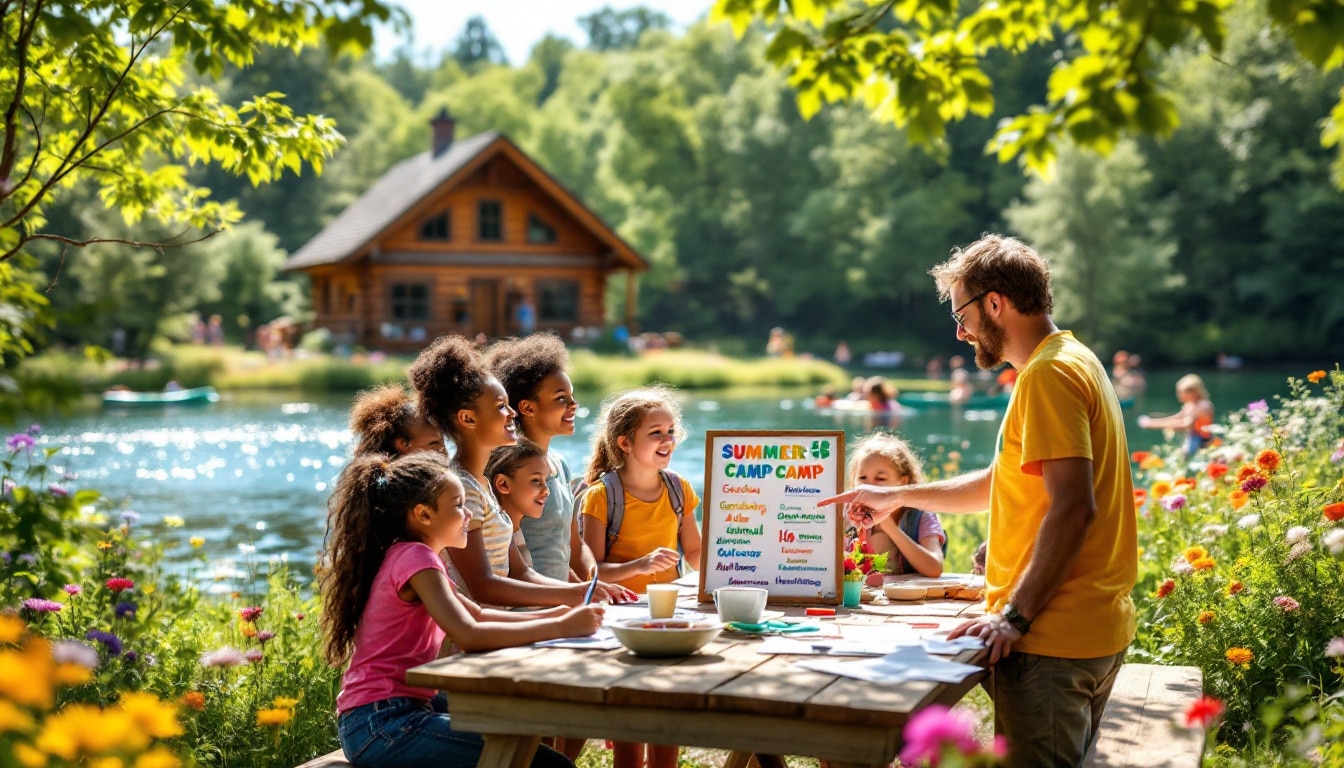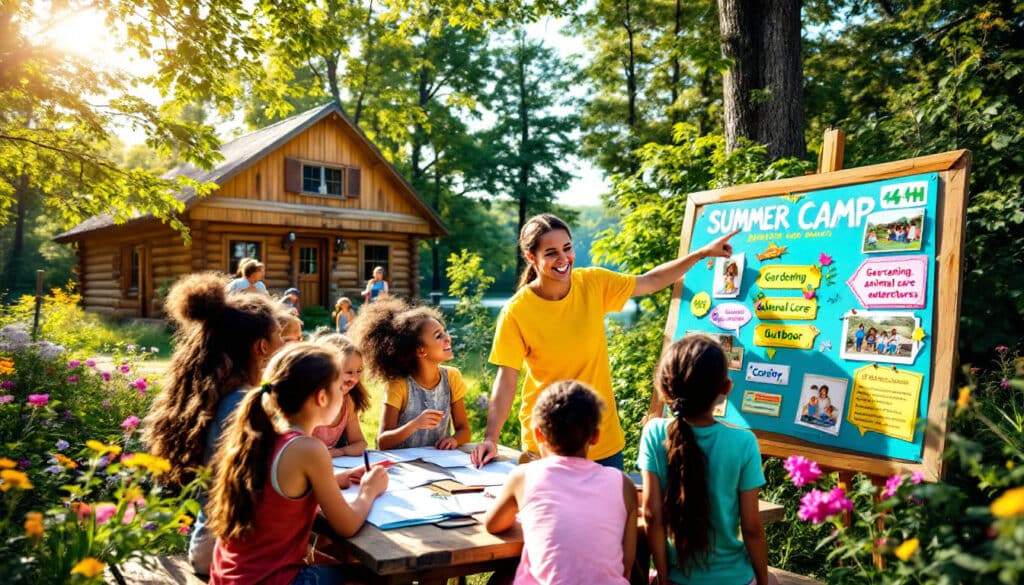Registration is open for 4-H summer camps under the auspices of the University of Guam’s extension and outreach. With a total of 20 camps, the first sessions begin on June 2. These camps cover a wide range of topics from science, technology, and mathematics to agriculture, nature, art, and home economics.
This summer, every child can find an activity that suits them. Varied programs such as crime scene detection, imaginative art, video game development, and culinary science will be offered. Instructors, experts from the University of Guam, will ensure a hands-on and enriching learning experience.

The registrations for the 4-H summer camps under the aegis of University of Guam Cooperative Extension & Outreach are now open, offering young people a unique opportunity to engage in enriching activities. With the launch of the first camps scheduled for June 2, this initiative promises a summer full of discoveries and learning for children and teenagers in the region.
Table of Contents
ToggleWhat activities are offered in the 4-H summer camps?
The 4-H summer camps offer an impressive variety of educational programs covering many fields such as science, technology, mathematics, agriculture, nature, art, and home economics. With a total of 20 camps available, there is something for everyone’s taste and passion.
Among the new offerings this year, several camps focus on mathematics, coding, and game development. These options are ideal for young people interested in modern technology and innovation. Other camps emphasize functional fitness, food dehydration, and sewing, thus offering practical and creative skills.
For younger children, aged 6 to 10, eight half-day camps are available, either in the morning or afternoon. Teens aged 11 to 14 have access to ten different camps, offering half-day or full-day activities. Finally, high school students aged 15 to 18 can participate in a two-week camp titled “Reef Futures,” focused on sustainable fishing.
How do the 4-H summer camps operate?
All 4-H summer camps are led by experts from the University of Guam (UOG), who provide a quality education similar to that offered at the university. The program places a strong emphasis on hands-on learning, allowing participants to fully immerse themselves in the activities offered.
Children and teens benefit from a dynamic and interactive learning environment where they can develop new skills while having fun. For example, the Crime Scene Investigation camp for 6-10 year olds offers an introduction to crime-solving techniques, while the Micro:bit Adventures and Mini Math Explorers spark younger participants’ scientific curiosity.
For adolescents, programs like Level Up GameDev with MakeCode Arcade and Beats and Bytes with Python allow exploration of video game development and programming—skills highly sought after in today’s tech-driven world. Additionally, camps such as Sustainable Agriculture for the Next Generation and Insects: The Good, the Bad, and the Ugly educate youth on the importance of sustainable agriculture and biodiversity.
What are the registration procedures for the 4-H camps?
Registrations for the 4-H summer camps are open, and it is crucial to register quickly as places are limited and allocated on a first-come, first-served basis. Registration fees range from 100 to 200 dollars, depending on the chosen camp.
To register, interested parties must visit https://url.uog.edu/4H-summer, where they will find the registration form as well as payment instructions. It is recommended to complete the registration as soon as possible to secure a spot in the desired camp. For questions or assistance, contact can be made at (671) 735-2040/1 or by emailing 4hcamp@triton.uog.edu.
What are the benefits of the 4-H camps for youth?
Participating in the 4-H summer camps offers numerous advantages to youth, both personally and academically. These camps allow children and teenagers to develop essential skills such as teamwork, problem-solving, and critical thinking.
Furthermore, participants gain practical knowledge that can inspire them in their future careers. For instance, activities related to marine technology and sustainable fishing in the “Reef Futures” camp can spark an interest in careers related to the environment and the sea, similar to the initiatives of fishermen from Lake Mac in search of big catches, as described in this article.
The camps also provide a safe environment where youth can explore their passions while making new friends and building their self-confidence. The diverse activities ensure that each participant can find an area they are passionate about and thrive in this stimulating environment.
How do the 4-H camps contribute to sustainable development?
The 4-H summer camps incorporate principles of sustainable development into their programs, raising awareness among youth about the importance of preserving our environment. Camps like Sustainable Agriculture for the Next Generation and Reef Futures emphasize sustainable practices and encourage participants to adopt environmentally friendly behaviors.
Moreover, these initiatives align with global issues, such as those addressed in the webinar on maritime transport and trade challenges in Africa, organized by UNCTAD. By educating youth about the environmental and economic impacts of their actions, the 4-H camps help foster a conscious and proactive generation in the face of ecological challenges.
Hands-on activities like food dehydration and sustainable fishing allow participants to concretely understand how simple actions can have a positive impact on the environment. These educational experiences are essential for instilling values of responsibility and sustainability from a young age.
What is the schedule for the 4-H summer camps?
The schedule for the 4-H summer camps is well-structured to offer a variety of activities throughout the summer season. The first camps begin on June 2 and continue until the beginning of August, allowing for flexible planning for families.
For children aged 6 to 10, the camps are divided into different sessions:
- June 2–6: Crime Scene Investigation
- June 2–6: Imagination Art Explorers
- June 9–13: Mission: Move!
- June 9–13: Sew, Stitch, and Fun in the Kitchen
- June 30 – July 3: Crazy Chemistry
- June 30 – July 3: Kids in the Kitchen: Food Drying
- July 7–11: Micro:bit Adventures
- July 7–11: Mini Math Explorers
For teens aged 11 to 14, the sessions are as follows:
- June 2–6: Level Up GameDev with MakeCode Arcade
- June 2–6: Think Like a Mathematician
- June 9–13: Micro:bit Masters: Code the Real World
- June 9–13: Financial Literacy
- June 16–20: Repiyer Remosuwe: Wisdom of Our Ancestors
- June 30 – July 3: Sustainable Agriculture for the Next Generation
- June 30 – July 3: Insects: The Good, the Bad, and the Ugly
- June 30 – July 3: Crime Scene Investigation
- July 14–18: Beats and Bytes with Python
- July 14–18: Exploring the Art of Math
- July 22 – August 1: Junior Fisheries: Growing Up Fishery Friendly
For high school students aged 15 to 18, only one camp is offered:
- June 23 – July 3: Reef Futures: Guam High School Fishery Pathways
This well-thought-out schedule allows families to choose dates that best fit their summer plans while offering a variety of programs suited to each age group.
Who are the instructors of the 4-H camps?
The 4-H summer camps are led by experts from the University of Guam who bring their expertise and passion to the young participants. These instructors are specialists in their respective fields, ensuring a high-quality education and an enriching experience for every participant.
The facilitators prioritize a hands-on and interactive approach, allowing youth to actively engage in the activities offered. For example, during the Crazy Chemistry camp, children learn through fun scientific experiments, while the Micro:bit Adventures sessions allow teens to create real coding projects.
This expertise is also reflected in a rigorous crafting of the programs, aligned with the academic standards of the university while being adapted to the needs and interests of the young participants. Additionally, the instructors are trained to foster an inclusive and safe environment where every child can fully thrive.
What is the cost of the 4-H summer camps?
The registration fees for the 4-H summer camps range from 100 to 200 dollars, depending on the camp chosen and the duration of participation. This cost covers all the proposed activities, necessary materials, and guidance from qualified experts.
To facilitate access to these educational programs, several payment options are available via the website https://url.uog.edu/4H-summer. It is advisable to check the various funding options or scholarships available for families who may benefit from them.
Investing in a 4-H summer camp is investing in your child’s personal and academic development, providing enriching experiences that can have a lasting impact on their future.
What feedback do previous participants of the 4-H camps have?
The 4-H summer camps enjoy an excellent reputation thanks to the positive feedback from participants and their families. Former participants highlight the quality of the educational activities, the knowledgeable guidance, and the warm atmosphere that prevails in the camps.
Many families appreciate the diversity of the programs offered, allowing each child to find an activity that aligns with their interests and passions. Testimonials emphasize the positive impact of these camps on the youth’s self-confidence, teamwork skills, and intellectual curiosity.
Furthermore, parents recognize the added value of hands-on and interactive teaching that complements the formal education received in school. The experiences gained during the 4-H camps are often cited as pivotal moments in young people’s journeys, encouraging them to pursue fields in science, technology, or the arts.
How do the 4-H camps fit into the overall educational program?
The 4-H summer camps integrate perfectly into the overall educational program by offering enriching and practical complements to the theoretical knowledge acquired in class. By focusing on fields such as science, technology, mathematics, agriculture, and art, these camps allow youth to apply what they have learned concretely and explore new disciplines.
For instance, camps centered on coding and game development offer teens the opportunity to develop programming skills that are increasingly in demand in the job market. Similarly, activities related to sustainable agriculture raise awareness among youth about environmental issues and encourage them to adopt nature-friendly practices.
Moreover, the camps emphasize the development of transversal skills such as communication, problem-solving, and creativity. These skills are essential for future academic and professional success, and the 4-H camps play a key role in their acquisition.
Finally, the 4-H camps promote a holistic approach to education, taking into account the personal development of youth as well as their academic progress. This integrated approach contributes to forming balanced, competent individuals ready to face the challenges of tomorrow.
What are the selection criteria for the 4-H camps?
Registration for the 4-H summer camps is open to all youth aged 6 to 18, divided into different age categories to ensure that each participant benefits from a program suited to their developmental level and interests. The main selection criteria include the participant’s age and adherence to registration requirements, including submission of the form and payment of corresponding fees.
As places are limited, registrations are processed on a first-come, first-served basis. It is therefore recommended to register as soon as the registration opens to maximize the chances of obtaining a spot in the desired camp.
Additionally, while the camps are accessible to all, some specialized programs may have additional requirements, such as a coding skill level for game development camps or a demonstrated interest in science for chemistry and crime scene investigation camps.
For families wishing to enroll their children, it is important to check the specific details of each camp and ensure that the chosen program aligns with the child’s interests and abilities. This ensures a fulfilling and beneficial experience for the young participant.
How do the 4-H camps evolve each year?
The 4-H summer camps adapt each year to meet the changing needs of youth and advancements in technology and education. This constant evolution allows the camps to remain relevant and attractive by offering both traditional and innovative programs.
Each season, new camps are introduced to reflect emerging interests and current trends. For example, this year, several new programs focused on coding, game development, and functional fitness have been added, responding to the growing demand for digital skills and dynamic physical activity.
Moreover, existing camps are regularly updated to incorporate the latest educational methods and cutting-edge technologies. Feedback from participants and families is taken into account to continuously improve the camp experience, thus ensuring high-quality teaching and consistently engaging activities.
Additionally, the 4-H camps collaborate with various experts and local organizations to enrich their programs and provide unique experiences. This collaboration allows for diversifying the offerings and leveraging available community resources to offer varied and enriching activities.
Finally, the 4-H camps integrate current themes such as sustainable development, marine technology, and environmental issues, raising youth awareness of contemporary problems and encouraging them to become agents of positive change in their communities.
Where do the 4-H summer camps take place?
The 4-H summer camps take place in various locations spread across the island of Guam, providing easy access for families residing in different areas. The chosen sites are equipped with all necessary facilities to host youth in a secure environment suitable for the activities offered.
Each camp is located in an environment conducive to learning and growth, whether it involves scientific laboratories for chemistry camps, equipped kitchens for culinary workshops, or outdoor spaces for outdoor activities and sustainable agriculture. This diversity of locations creates varied and stimulating experiences for participants.
Moreover, the facilities are regularly evaluated and updated to ensure the safety and comfort of youths. The instructors ensure that each site meets current safety standards and offers optimal conditions for the execution of educational and recreational activities.
Furthermore, some camps may take place in specific locations related to their theme. For instance, the “Reef Futures” camp is organized near coral reefs, allowing participants to learn directly on-site about sustainable fishing practices and marine ecosystem preservation.
For interested families, details about the locations of each camp can be found on the website https://url.uog.edu/4H-summer, allowing them to choose the one that best meets their expectations and the location of their home.
What financial support is available for the 4-H camps?
To make the 4-H summer camps accessible to as many people as possible, various financial support options are available. Registration fees, ranging from 100 to 200 dollars, can represent a significant investment for some families. To address this challenge, several aid mechanisms have been put in place.
First, scholarships and grants are offered to families with specific financial needs. This assistance helps reduce registration costs and ensures that young talents are not limited by budget constraints.
Next, partnerships with local businesses and community organizations are developed to fund camps or offer discounts to participants. These collaborations enhance the ability of the 4-H camps to provide quality programs to a diverse audience.
Finally, fundraising campaigns and special events are regularly organized to support families wishing to enroll their children in the camps. These initiatives help raise additional funds and raise community awareness about the importance of these educational programs.
For more information on available financial support options, families are invited to contact camp organizers directly at (671) 735-2040/1 or by email at 4hcamp@triton.uog.edu. These discussions will help find the best solution tailored to each situation.
What success stories arise from the 4-H camps?
The 4-H summer camps have contributed to numerous success stories, both for the participants and the community as a whole. The experiences gained at these camps often play a crucial role in the personal and professional development of youth.
An inspiring example is that of former participants who, after attending camps focused on technology and science, pursued higher education in STEM (Science, Technology, Engineering, and Mathematics) fields. Some have even launched innovative projects or embarked on careers in marine research, thus contributing to the technological and sustainable development of Guam.
Moreover, the leadership and teamwork skills developed during the 4-H camps have enabled many participants to thrive in various professional sectors. These skills are particularly valued in demanding fields like marine technology, where collaboration and innovation are essential.
The 4-H camps also have a positive impact on the local community. For example, the sustainable fishing initiatives taught in the “Reef Futures” camp have raised awareness among youth of the crucial role they play in preserving marine ecosystems, thus contributing to more responsible and environmentally respectful fishing practices.
Additionally, community projects initiated by former participants of the 4-H camps, such as environmental awareness programs or coding workshops for youth, strengthen the social and educational fabric of the region. These initiatives demonstrate participants’ commitment to using the skills acquired for the collective good.
These success stories illustrate the lasting impact of the 4-H summer camps and highlight the importance of supporting such educational initiatives for future generations.
How do the 4-H camps adapt to participant diversity?
The 4-H summer camps are designed to accommodate youth from diverse backgrounds, creating an inclusive and respectful environment for diversity. This approach fosters intercultural exchange and allows each participant to feel valued and understood.
To ensure this inclusivity, the 4-H camps offer a range of varied activities that meet the interests and abilities of everyone, regardless of their social, cultural, or economic background. The programs are designed to be accessible to all, with specific adaptations for participants with particular needs.
Furthermore, special attention is given to creating a safe and welcoming environment where every youth can express their ideas and learn from others. Instructors are trained to manage diversity within groups and to encourage respect and cooperation among participants.
The 4-H camps also integrate themes of cultural awareness and environmental respect, thus enriching participants’ experiences and enhancing their understanding of global issues. This holistic approach helps to develop youth who are conscious and open-minded, ready to engage positively in their communities.
Finally, available support initiatives and scholarships ensure that even families with financial constraints can participate in the camps, thus fostering greater diversity and equitable representation across all segments of society.
In summary, the 4-H summer camps are an example of how educational programs can promote inclusion and diversity, contributing to the formation of a generation of respectful and engaged leaders.
How do the 4-H camps encourage innovation?
Innovation is at the heart of the 4-H summer camps, which aim to stimulate the creativity and critical thinking of young participants. By offering programs focused on science, technology, engineering, and mathematics (STEM), the 4-H camps encourage youth to explore new ideas and develop innovative solutions to real-world problems.
Hands-on activities, such as video game development and coding, enable participants to combine creativity and technical skills, thus fostering an innovative approach to learning. For example, the Level Up GameDev with MakeCode Arcade camp provides teens with the opportunity to create their own games, stimulating their imagination and ability to solve complex problems.
Moreover, the 4-H camps incorporate research and development projects where youth can experiment and test new ideas in a supportive and secure environment. These projects encourage participants to take personal initiative, collaborate with peers, and apply their knowledge in a practical manner.
The instructors, who are experts in their fields, play a crucial role in guiding young people in their innovative endeavors. Their mentorship allows participants to benefit from personalized advice and advanced resources, thus facilitating the realization of their ideas.
Finally, the 4-H camps regularly organize competitions and presentations where young people can share their innovations with a wider audience. These events provide a platform to recognize and celebrate participants’ achievements, thus reinforcing their motivation and confidence in their innovative capabilities.
By fostering an environment conducive to innovation, the 4-H summer camps play an essential role in shaping future leaders capable of developing innovative solutions for a constantly evolving world.









